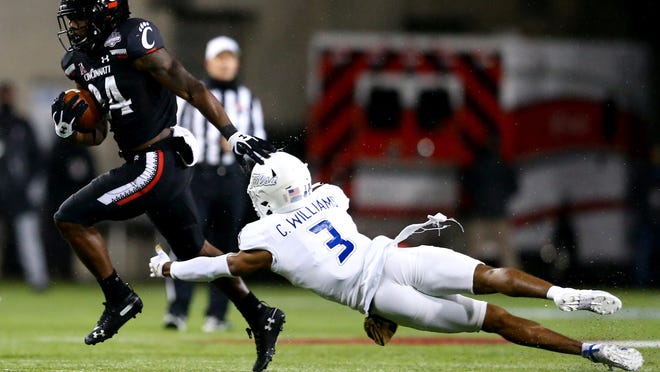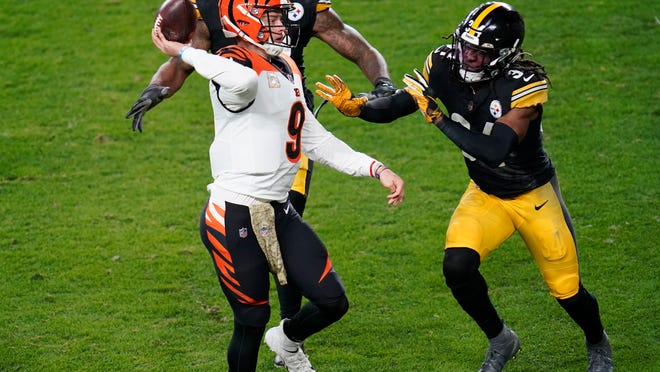

James Tunstall lined up at left tackle like he always did.
It was Nov. 16, 2019, and 13 months before Tunstall announced he would transfer from Stony Brook to play his senior season for the University of Cincinnati football team. Back then, he was starting his 11th game on Stony Brook’s offensive line and putting the finishing touches on the season that turned around his football career.
This game was different because Dequan Campbell was there to watch him for the first time. This season was different because Tunstall had Campbell by his side.
Tunstall had dedicated his 2019 FCS All-American season at Stony Brook to Campbell, his friend who was dealing with a central nervous system disorder and “uncontrollable” epilepsy.
That dedication helped change Tunstall’s football career and bring him to the Bearcats’ offensive line.
“My parents instilled in me that in life you always face adversity,” Tunstall told The Enquirer. “There’s always going to be challenges, and it’s about how you attack those challenges. It’s about overcoming whatever you feel is in your way.”

Tunstall and Campbell have known each other as long as they can remember. Their mothers grew up together, and although Tunstall and Campbell are three years apart, so did they.
When Campbell wanted someone to play football with, he looked to Tunstall. They both fell in love with the sport, dreaming of playing in college, as they threw the ball around in the backyard.
Tunstall was the first one to play organized football, learning the sport that eventually led him to the Cincinnati Bearcats. When Campbell was 7 years old, he joined a team, too.
His career only lasted one year.
“My first-grade teacher said I used to daydream,” Campbell said. “What we didn’t know was that it was a seizure. One day, the nurse recognized it, called my father and they got me to the hospital.”
After that, the hospital became a familiar setting for Campbell. The doctor told the 8-year-old he couldn’t play football anymore, and his focus turned toward getting back into the classroom.
Because Campbell said his medicine couldn’t consistently prevent him from having seizures, his parents took him out of school. He went to the hospital every month for testing, and if he could attend school in-person for a few consecutive weeks at a time, Campbell was ecstatic.
“I was always in the house,” Campbell said. “When it was bad, I didn’t see my peers, I wasn’t able to go to the park or anything like that. It was hard. Every now and then me and my brother would go outside with a football, but that was it.”
As closely as he could, Campbell kept up with Tunstall’s football career. When Tunstall reached high school, it was clear he had the size to play in college, even the NFL.
Yet during his junior season, Tunstall couldn’t earn a consistent role on the offensive line at Henry E. Lackey High School in Maryland.
“He played well, but I had really high expectations for him,” head coach John Lush said. “I’m really hard on my better players, and I really challenged him going into his senior year in the weight room.”
At the time, Stony Brook was interested in Tunstall, but he didn’t have much interest at the Division One FBS level. As a junior, Tunstall’s high school film showed great highlights, but he showed his weaknesses over a full game.
Lush couldn’t accept that inconsistency from Tunstall, who was already 6-foot-5 and more than 300 pounds.

“I threw him out of our weight room as a senior,” Lush said. “I kicked him out, I met with his parents, and I told him I didn’t believe he was living up to his potential and going as hard as he could.
“He was a Division I prospect at that point, and he could have looked at me and said ‘Who is this guy, he doesn’t know what he’s talking about.’ But he didn’t. By Wednesday, he was calling me and begging me to let him back in. I wouldn’t let him come in until the following week, and he came back in and never looked back.”
Tunstall applied himself in the weight room, and Lush named him a captain. In the first game of Tunstall’s senior season, Tunstall blocked multiple defensive linemen into the ground, and the Chargers’ best offense came when they ran behind him.
“I wasn’t as mature as I am now, and there were a lot of things in high school that I learned to do,” Tunstall said. “I learned to handle things the right way and always give 100 percent effort in everything I do. That’s something I’ve been thinking throughout my whole life. I can’t let adversity steer me away from what I want to accomplish.”
Tunstall became a two-star recruit and picked up more attention from FBS schools, especially the University of Connecticut. His decision came down to the week before National Signing Day. Tunstall picked UConn over Stony Brook even after the Huskies made a coaching change.
He got to play college football in the American Athletic Conference, one of the best six conferences in college football.
From the day he stepped on campus at UConn in 2017, Tunstall faced more adversity. Since he was far away from home and since his coaches weren’t the ones who recruited him, it was an unfamiliar setting.
Tunstall appeared in five games on UConn’s offensive line as a freshman and sophomore, and after his second season, he transferred to Stony Brook, the FCS school in New York that originally recruited him.

“As is typical of a lot of these kids when they’re in high school, they see the bigger school as the better option,” Lush said. “Going back in time, because he wasn’t familiar with the coaching staff, he probably should have gone with Stony Brook, the school he really knew.”
Heading to Stony Brook for the 2019 season, three years had passed since Tunstall had been a starter. He was in another new setting with another coaching staff, and Tunstall was looking for a better way to motivate himself for his junior year.
That’s when he reconnected with Dequan Campbell.
During the summer of 2019, Campbell should have been getting excited for his senior year of high school. He should have been playing sports and thinking about who he would be taking to homecoming.
Instead, Campbell was recovering from his second brain surgery.
“I was in a bad place,” Campbell said. “No matter what, I was always angry because I wasn’t able to live a normal high school life.”
Campbell had started doing as much conditioning as he could, hoping there could be a way he could salvage his senior year by playing on a football team for the first time since he was 8 years old.
The doctors tracked his progress, and they told Campbell he shouldn’t play.
When Tunstall heard about that, he called his mother.
“As a high school kid you get to experience a lot of things, and there were a lot of things he missed out on because of the condition he was diagnosed with,” Tunstall said. “I felt like there was something I could do that would mean the world to him.”
Tunstall’s mother told him that since Campbell was almost 300 miles away, there wasn’t much he could do. But Tunstall came up with something.
More:UC Bearcats offensive coordinator Mike Denbrock interviews at Vanderbilt, per reports
More:Bearcats assistant Dan Enos leaves UC to become Maryland's offensive coordinator
Before the season started, Tunstall called Campbell and told him he’d dedicate the 2019 season to him.
“We both shed a tear a little bit,” Tunstall said “We shared a real special moment; I remember it like it was yesterday.”
There was more. Campbell got his own Stony Brook jersey, and Tunstall’s friends and family wore bracelets that said ”Block For DC.” Then Tunstall invited Campbell to Stony Brook’s game against Delaware on Nov. 16.
It was the first football game Campbell said he had been to “in what felt like forever," and Campbell wore his Stony Brook jersey to the game.
In the first quarter, when Tunstall blocked an opposing defensive lineman so hard that he fell over, Tunstall looked up at the crowd and pointed to Campbell.
Tunstall said he had one of the best games of his career that night, and he pointed at Campbell after every big play he made.
“I wanted to be on the field, but it was still good watching him play like that,” Campbell said. “If I couldn’t make it, I’m glad that he could.”
At the end of the 2019 regular season, Tunstall was named an FCS All-American. It was the best year he’d ever had.
“I did my job for him,” Tunstall said.
That season also got Tunstall on the radar of high-level Division I college football coaches.
Initially, Tunstall planned to build on his 2019 season at Stony Brook, play another year there and then see what his options were with one more year of eligibility. But Stony Brook’s fall 2020 season was canceled because of coronavirus-related concerns.
When Tunstall entered the transfer portal at the end of the 2020 college football season, he only had film from the 2019 season to share with college coaches. Because of games like the one he had against Delaware, Tunstall got their attention.
“I think him dedicating his season helped him get where he needed to be,” Campbell said.” I feel like a part of him needed a push. He didn't want to let me down or his family down.”
Now that push has led him to play for head coach Luke Fickell and the Bearcats. Tunstall said UC was one of the first schools to contact him after he entered the transfer portal. Both of the Bearcats’ starting tackles in 2020, Darius Harper and James Hudson, declared for the NFL Draft after the Peach Bowl.
Tunstall said the Bearcats were aggressive in recruiting him to bolster their offensive line for 2021. On Jan. 6, he committed to play this season for UC.
“I want to have a repeat of last year at Cincinnati, going undefeated and making it to the College Football Playoff,” Tunstall said. “Personally, I definitely want to earn that starting spot at left tackle, and I want to be able to get any accolades I can. I want to be able to win and help this team keep winning because what they have here is special.”
Tunstall said he has already moved to the Cincinnati campus, started building a relationship with quarterback Desmond Ridder and had his first in-person meeting with Fickell.
Tunstall still speaks with Campbell often, hoping to keep the connection and that spark that fueled Tunstall’s career-changing 2019 season. Campbell finished high school, and he’s currently in a job search program. He wants to be a carpenter because he likes to work with his hands.
And when Tunstall speaks with his childhood friend, he shares his aspirations for his future.
“When I talked to him yesterday, he told me about how he wants to go to the NFL,” Campbell said. “Then he wants to make his hometown into a better community. He wants to build rec centers for kids from Maryland. That’s his push. He doesn’t want to let anybody down.”
Source link








